Our Internet Editor Carter Moon got an opportunity to talk to the comedian Joe Pera, whose gentle approach to comedy is simultaneously enigmatic and heartfelt. This interview was made possible thanks to friend of the mag Jacob Anderson, with transcription provided by Penny Pham. The following interview has been edited for length and clarity.
Joe, thank you so much for doing this.
Joe Pera: Thanks for having me, Carter.
I was really surprised to find out that you hadn’t actually grown up in Michigan. I wonder if you could talk about why you decided to set JOE PERA TALKS WITH YOU in Michigan, specifically.
JP: Um, we started the first live action show that we did with Adult Swim about how to pick out the perfect Christmas tree. And they asked us to do it in August, and it had to be shot by October so it’s there for Christmas that year. So we were just looking for places in major tree-producing states in the Midwest that would be most likely to get snow at that time of year. It actually didn’t snow, but we shot the outdoor stuff in Newberry, Michigan which is outside of Marquette and, um, I just kept doing research about Marquette and visiting and I really, I don’t know—I really enjoyed being there because, like, the people there have similar interests to where I grew up in Buffalo—you know, hockey and beer. But it was a little bit different and surrounded by more nature. The town, I mean, it’s— the whole town sits on, uh, right at the bottom of Lake Superior, which is, I thought, kind of thematically connected to the show.
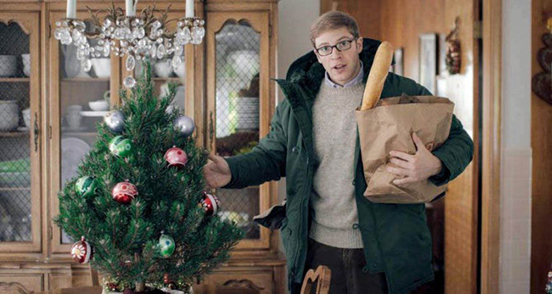
You really enjoy doing research, don’t you? That seems to be a big part of the show.
JP: It’s one of my favorite parts, for sure. I love the episode about lighthouses, right? I, you know, I bought a bunch of books about lighthouses, went online and just, you know, I really enjoyed thinking, just yeah, the pure research phase before I figure out how to entwine it into the storyline and decide what to share. It’s one of my favorite things to do, is just sit and read, so unfortunately I got to produce a script eventually. I don’t know, I’m excited to read those things and I’m excited to share some of the more interesting things, so, I mean, that’s kind of the core of the show.
I wonder if you could talk about your relationship with Conner O’Malley. On the surface, it seems like you guys have very different comedic sensibilities, so I’ve always wondered what you guys have in common.
JP: I think we have, you know, very similar interests in and out of comedy. He grew up in Chicago, I grew up in Buffalo. When we met, I forgot what year it was, 2014-2015 at his show, we just really hit it off and it was very— I mean he’s one of the funniest people I think in the whole city… You get things added in the show, and even through some of his louder characters, he’s a really caring person, and sensitive. I don’t know. He’s a great friend.
What I really like about how he gets to be on the show is that it sort of brings out a side of him that I wouldn’t have expected just from, you know, his internet videos and things like that. You sort of bring out a depth in him that’s really cool.
JP: Yeah, he’s great.
When you look back at how you developed your character from Zero Fucks Boyd on THE CHRIS GETHARD SHOW to the version of yourself that you play now on JOE PERA TALKS WITH YOU… Can you think of a specific moment that you found your specific voice as a comedian?
JP: That CHRIS GETHARD SHOW character is more or less the same thing that I’m doing, I just… I’ve been doing stand-up since I was in school and, uh, so I don’t know. It didn’t start with Zero Fucks Boyd, that was just me saying the f-word because they asked me to. Yeah, I guess the difference between my stand-up and me and on the show is that we had to fictionalize my life a little bit, but we didn’t want to do a show about a stand-up in New York City, for a number of reasons… You know, it was a little weird getting those details but it just, I think I got it with, like, some of my friends in college—instead of doing comedy I became a choir teacher like them.
What would you say are some of your major influences in comedy, but then also just in art in general?
JP: Shoot, I always think I should write that down… But I was talking the other day with my friend, and he was asking me if I’d seen, uh—what was it, the David Lynch film about—I forget the name. He made it for Disney, but it was about a guy who drives a tractor across the country… He asked me if I saw it, I said no, and then I realized that my dad had—when my mom was out of town busy—my dad took us to see it. And it was basically just this guy who can’t—he’s too old for a license to drive across the country and he brings processed meat like baloney and jerky along the way and just puts him on a tractor driving across the country and uh, I remember that I saw it, and he said, “I’m almost sure that it itself is in your subconscious.”
Yeah, absolutely.
JP: I thought it was similar to the show.
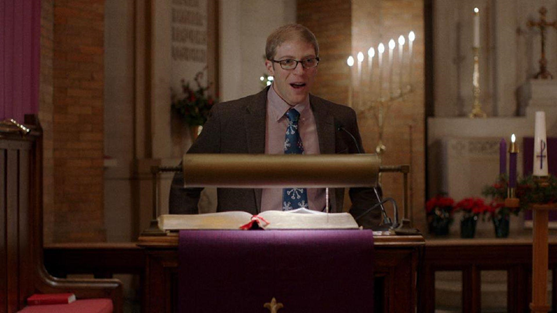
So something that I really am drawn to about your show is that everybody in their own way is nervous and afraid of things and is getting over their fears in different ways, and I’m wondering—when you’re writing your show—how you think about how different people express anxiety and fear. Because you portray it in so many different ways, and I’m curious about how you approach that feeling from a lot of different angles.
JP: That’s a good question. Yeah, I guess like any script, the variety of characters gives you an opportunity to see whatever you want—and you know, express a subject from a number of sides… I think anxiety is a pretty common thing, I deal with it, really—taking it out on yourself or other people is not, neither’s good— you know, you kind of—you know, learn some tricks to get through it. You know, some of the people involved in the show have anxiety or, you know, are bogged down by worries. And as I’m writing the show, I’m worried whether it’ll be good or not, doing a hundred things to make the show…
It’s funny because the show doesn’t really feel like you’re trying to like, solve anxiety or solve fear, it’s more like… your characters are finding ways to live with it, and I think that’s really refreshing.
JP: Yeah, I guess maybe the show has a bigger thing than you know, it’s kind of the way that we hope that people—it’s relaxing enough that people can watch it right before bed and feel good. It’s kinda the show itself is kind of the time to deal with that. Like the episodes we do when I try to talk the audience to sleep, you know, it kinda—I guess I can’t sometimes help my own anxieties, sometimes it helps to—try and help others. Sometimes when I am editing the calmer episodes like the sleep ones, I remember that whole period while I was worried about how it would come out and whether the comedy would work and stuff. It was nice to kind of get to feel what you’re writing and listening to music that was in the show and what inspired it and, you know. The process of making something calming can have a calming effect on me.
Absolutely, yeah, that’s actually exactly what I wanted to ask you about next, is how you stay so calm when your show is about addressing fears, addressing anxieties that we all have. There’s a very zen quality to the show, and I wonder, does that just come from the process of making it? Or is there something else that you’ve sort of been able to figure out in your own life that allows you to sort of center yourself and calm yourself?
JP: Yeah, I have some tricks that I’m working on now. I honestly think the best thing for me is to be working on the show and thinking about a specific problem in the script or worrying about the show. How the show will come out, and all the things that surround it. That’s absorbed a lot of it… I’m considered very lucky that I’m able to—to do the show full-time—and also I don’t have a wife or a kid right now, so I’m kind of, while we’re making the show I put on as much as possible—kind of allowed to just think about the show, which is a real luxury… But you know, just being able to obsess over making one thing right for me is the best way to push off everything else. So I don’t know, you could do the same. My mom’s friend quilts, and I think that like anything that’ll absorb your attention and creativity, you know, I think that’s the best way to, you know, focus your mind on one thing for a little bit.
The thing I like about your comedy so much is that you never talk down to anyone and that seems to be a core philosophy of the show. Do you sort of consciously think about that or is that just sort of naturally how you approach other people?
JP: I mean, that’s the goal, yeah. Yeah, with the show luckily we have the opportunity to edit but… Yeah, I try to approach everything like that.
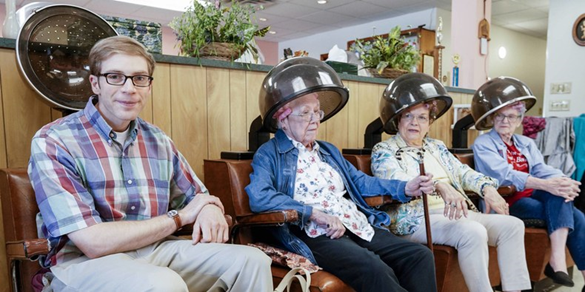
I wonder, do the non-traditional actors who have become part of the show, do they ever tell you what they think of the episodes after they come out?
JP: Yeah, I think for the most part, people—once they see it, it’s easier to understand. You know, ‘cause some of the lines are a little silly or abstract at times, but when it comes together I think they like, they like it and are happy they participated… Like Gene, in the first season, you know, he had no right to trust—he’d seen some of our work and my stand up, I mean we hadn’t made an episode of the show yet. He didn’t know what he was signing up for and just kind of trusted me and Marty so much for doing that. ‘Cause he wanted to attempt—you know, do acting and make a real attempt at it, and he’s older—I give so much credit for, you know, wanting to start something new… Yeah, so I’m glad that he liked the show. I remember the first scene—after the first scene, after we did it, he’s like, “Oh, it makes sense now, that seems right.” Because, um, sometimes it’ll seem strange when we’re shooting or on paper.
Sure, yeah. I heard you talk about this on your BULLSEYE interview, but I really wanted to highlight it ‘cause it was very interesting to me. Why do you let imperfections and “mistakes” sort of stay in the show?
JP: I don’t know. It’s when the funniest stuff happens. Uh, I don’t know, it is to me, I could make some bullshit statement about how nothing is perfect and stuff like that… I mean comedy is when unexpected stuff happens and when—I think the example I used on that show was when Jo Firestone accidentally finished, kind of like, the scene and it was just a real simple scene but she accidentally hit the doorway or sometimes, like, if I trip in a take accidentally, you know, I think that’s funny. That’s what it comes down to—people want to see, you know. We love AMERICA’S FUNNIEST HOME VIDEOS. We incorporate a little of that into the show and, um, you know, it’s just funny to me. Also, it’s a good way to excuse our mistakes, you know? Just to say, “Oh yeah, yeah that’s part of it, we love it.”
You know, I think my personal favorite episode that I’ve seen so far is “Joe Pera Reads the Church Announcements.” Can you talk a little bit about the development of that episode and how it came to be?
JP: I think I was just driving with Dan Licata and “Baba O’Riley” came on the radio, and I guess it was just an idea that even today, if you heard that song for the first time, it’ll still be very impressive that you hadn’t heard it, considering how ubiquitous it is, you know? So, it just really came from a one-line premise when I heard the song for the first time at my age. Um, yeah, we just figured out like—how not to make it complicated, but just to keep—how to present that in the funniest way possible… I don’t think we have any episodes that are quite as straightforward as, like, the grocery store one where I go grocery shopping, but even that has more twists and turns. With that one it’s just, you know, one what if question. Across a bunch of scenes and then—having the most fun with it as possible. I’d love to try something else but—to do that you kind of, you need the right idea to pull it off.
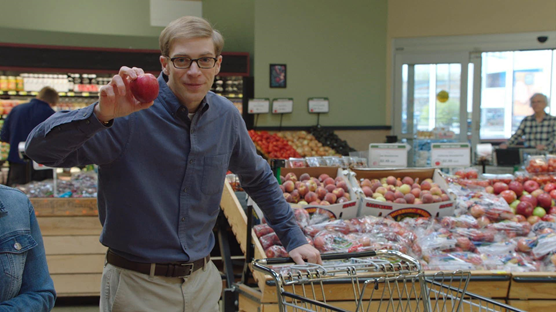
That is something about the show that I really adore, is that a lot of the time, some of the best episodes are the ones where it is simple in theory, where it is just sort of—you’re teaching a piano lesson or you’re dealing with the power being out. Something that seems kind of mundane and it spirals out from there. Is that a central conceit of the show, to take seemingly simple and mundane things and show the richer subtext underneath them?
JP: No, well, I don’t know. I wouldn’t say that’s the overall goal, you know? It’s more just like, how can we execute this idea as straightforward as possible? And that for the most part, we don’t use fancy camera work… A lot of the lines are very concise. It’s just you know, how can we get the most out of this idea in a way that, you know, feels simple but hopefully has a little bit—has enough depth to it. Like, there’s a lot of stuff that we’d like to get into, but, I don’t know, something like going to the grocery store is pretty rich with a bunch of different angles.
Absolutely, I agree. Do you know the filmmaker Joel Potrykus? He’s also from Michigan and in some ways his work reminds me of yours. He’s made some very low-budget but very exciting movies. There’s this one called BUZZARD and another one called RELAXER that are both really great and yeah, I just—
JP: Oh, I think I—No, I’m writing that down right now.
He’s somebody I admire a lot and he’s similar to you, I think, in the sense that he also does a lot with a little and figures out how to take a simple premise and expand it out. And yeah, I see a lot of similar sensibilities in both of you guys and it’s funny that you’re both sort of based out of Michigan. So yeah, I just wanted to throw that out there… I wanna let you go, but whenever I talk to comedians I always like to ask them this question: What is your favorite joke written by someone else?
JP: Man, definitely have a couple, I don’t know. But one of Dan Licata’s I really love is inappropriate out loud. Let’s see. I don’t know. I like kind of goofy stuff. The one that comes to mind is Carmen Christopher, who plays one of the goofballs in the “Bachelor Party,” episode has a song called “Basketball”… it’s just like a three-minute song that he performs for a while—he made a video—you can look it up, just search “Carmen Christopher Basketball” on YouTube, you’ll find it—but how he would do it, it’s so simple, the way he performs it is really funny, I don’t know. It makes me laugh, you know, I’ll never get it out of my head.
Well Joe, this has been an absolute delight and I really, really appreciate you taking the time to talk to me, and yeah, I just appreciate the show so much.
JP: Thank you, I really appreciate you having me. And I’ll look up that director too.


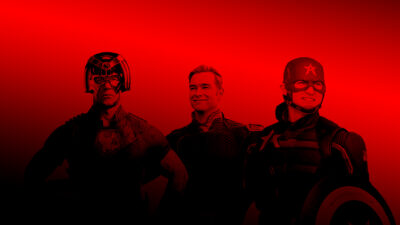







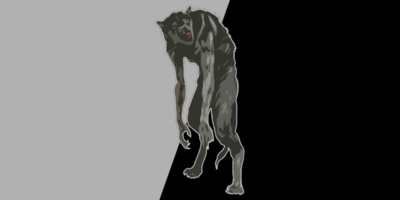

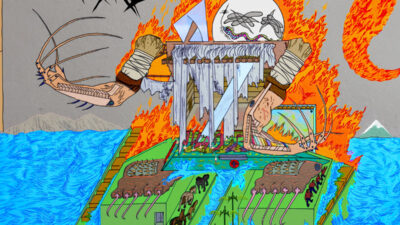
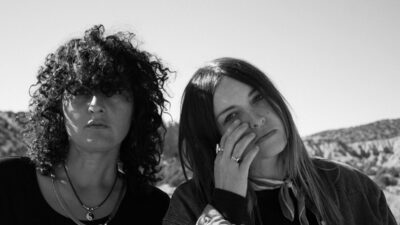

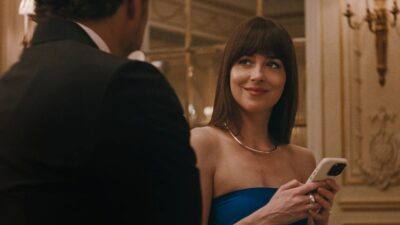
Comments